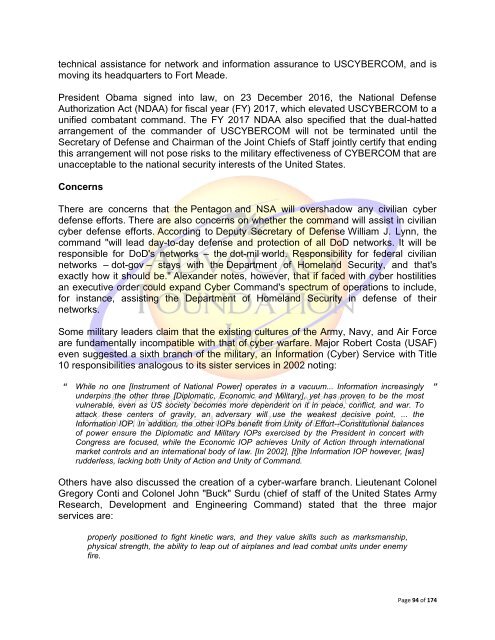International Cyber Terrorism
International Cyber Terrorism
International Cyber Terrorism
- No tags were found...
Create successful ePaper yourself
Turn your PDF publications into a flip-book with our unique Google optimized e-Paper software.
technical assistance for network and information assurance to USCYBERCOM, and is<br />
moving its headquarters to Fort Meade.<br />
President Obama signed into law, on 23 December 2016, the National Defense<br />
Authorization Act (NDAA) for fiscal year (FY) 2017, which elevated USCYBERCOM to a<br />
unified combatant command. The FY 2017 NDAA also specified that the dual-hatted<br />
arrangement of the commander of USCYBERCOM will not be terminated until the<br />
Secretary of Defense and Chairman of the Joint Chiefs of Staff jointly certify that ending<br />
this arrangement will not pose risks to the military effectiveness of CYBERCOM that are<br />
unacceptable to the national security interests of the United States.<br />
Concerns<br />
There are concerns that the Pentagon and NSA will overshadow any civilian cyber<br />
defense efforts. There are also concerns on whether the command will assist in civilian<br />
cyber defense efforts. According to Deputy Secretary of Defense William J. Lynn, the<br />
command "will lead day-to-day defense and protection of all DoD networks. It will be<br />
responsible for DoD's networks – the dot-mil world. Responsibility for federal civilian<br />
networks – dot-gov – stays with the Department of Homeland Security, and that's<br />
exactly how it should be." Alexander notes, however, that if faced with cyber hostilities<br />
an executive order could expand <strong>Cyber</strong> Command's spectrum of operations to include,<br />
for instance, assisting the Department of Homeland Security in defense of their<br />
networks.<br />
Some military leaders claim that the existing cultures of the Army, Navy, and Air Force<br />
are fundamentally incompatible with that of cyber warfare. Major Robert Costa (USAF)<br />
even suggested a sixth branch of the military, an Information (<strong>Cyber</strong>) Service with Title<br />
10 responsibilities analogous to its sister services in 2002 noting:<br />
“ While no one [Instrument of National Power] operates in a vacuum... Information increasingly<br />
underpins the other three [Diplomatic, Economic and Military], yet has proven to be the most<br />
vulnerable, even as US society becomes more dependent on it in peace, conflict, and war. To<br />
attack these centers of gravity, an adversary will use the weakest decisive point, ... the<br />
Information IOP. In addition, the other IOPs benefit from Unity of Effort--Constitutional balances<br />
of power ensure the Diplomatic and Military IOPs exercised by the President in concert with<br />
Congress are focused, while the Economic IOP achieves Unity of Action through international<br />
market controls and an international body of law. [In 2002], [t]he Information IOP however, [was]<br />
rudderless, lacking both Unity of Action and Unity of Command.<br />
”<br />
Others have also discussed the creation of a cyber-warfare branch. Lieutenant Colonel<br />
Gregory Conti and Colonel John "Buck" Surdu (chief of staff of the United States Army<br />
Research, Development and Engineering Command) stated that the three major<br />
services are:<br />
properly positioned to fight kinetic wars, and they value skills such as marksmanship,<br />
physical strength, the ability to leap out of airplanes and lead combat units under enemy<br />
fire.<br />
Page 94 of 174
















